Share Your Input and Connect at Our Family Advisory Council Open Forum on May 8
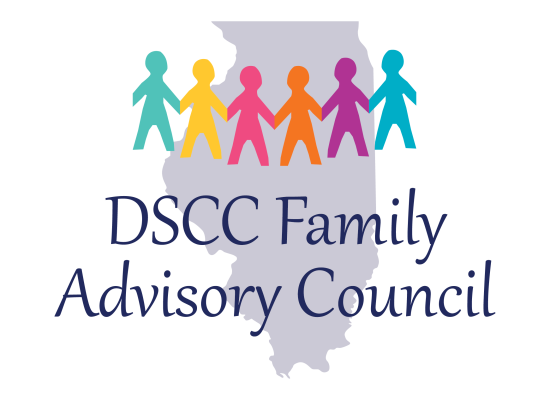
We invite all Illinois families of children with special healthcare needs to share their feedback and experiences at this virtual forum.
Join us for an opportunity to connect with other families and share your feedback on topics that matter to you.
Our next Family Advisory Council (FAC) open forum is on May 8 from 9 to 11 a.m.
This free virtual meeting is for all Illinois families of children with special healthcare needs. You do not have to be a Division of Specialized Care for Children (DSCC) participant to attend.
You can sign up on Zoom to join the meeting. Please note that live Spanish translation will be available during the open forum.
The FAC guides our efforts to strengthen teamwork, improve communication and empower families to have a voice in their children’s care. The council also connects families to resources and other families who are on a similar journey.
Our FAC has also played an important role in developing:
- Our DSCC Family Portal to help families more easily communicate and share information with their DSCC care coordination team
- NurseNet, a digital platform that connects Illinois families needing nursing care with local home health agencies
- “All About Me” Page templates to help providers, care coordination teams, schools and other caregivers understand the likes, strengths and needs of each child beyond their medical diagnosis
- Our free, virtual Health Insurance Education Series to help families navigate the insurance maze and better understand their coverage and benefits
- Improvements to our family survey process, including reducing the number of surveys that families receive
- Updates to our online Resource Directory and more
You can find the minutes from past meetings and more details on our website’s Family Advisory Council page.
You can also visit our Family Stories page to learn about some of the family members who serve on the council:
If you have questions or would like more details on how to participate in the FAC, please email dsccfac@uic.edu.
We hope to see you on May 8!
Sensory-Friendly and Inclusive Holiday Events for All Ages
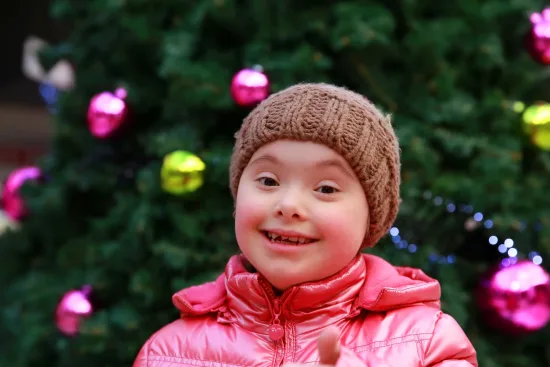
Experience the magic of the season with Santa visits, light displays and other fun events happening throughout Illinois.
The holiday season is a time for joy, connection and celebration. For individuals with sensory sensitivities and other disabilities, traditional festivities can sometimes feel overwhelming.
We’ve gathered a list of inclusive and sensory-friendly holiday events happening throughout Illinois to help families celebrate the season.
There are light displays, sensitive Santa opportunities, parades and more going on throughout Illinois.
Our Special Events page includes a roundup of opportunities designed specifically for youth with disabilities and special healthcare needs.
We hope this collection of events will help spark ideas to create your own holiday magic:
- The Secret Sleigh Project coordinates volunteers to provide in-home Santa visits to children who are medically fragile nationwide. See our Secret Sleigh event listing for more details on how to request a visit.
- Autism Speaks and Cherry Hill Programs will provide free sensory-friendly Santa experiences at multiple shopping centers in Illinois on Dec. 8. You must sign up to attend. Photo packages will be available to buy. Visit the Santa Cares website for a complete list of Santa’s stops. Be sure to select “Santa Cares”, “Caring Santa” or “Sensitive Santa” when checking your location. (Note some event dates and times may vary. Please check your location to confirm your date and time.)
- The National Federation of the Blind is offering letters from Santa and winter celebration letters in Braille to children who are blind or have low vision. The program is for children 10 years old and younger. Please complete the letter request form by Dec. 16. Letters are available in English or Spanish. If you have any questions, call (410) 659-9314, ext. 2236, or email education@nfb.org.
- Enjoy a movie on the big screen with the lights up, lower sound and the freedom to get up, dance, walk, shout or sing. Visit the following sites to find more details and a theater near you:
- For families in the Chicago area, Chicago Parent magazine has a roundup of sensory-friendly Chicagoland events as a list of free holiday activities for Chicagoland families. Activities include:
- In central Illinois, enjoy time with Santa at the sensory-friendly “Meet and Greet with Santa” in Springfield or the “Sensory Hour Sweets with Santa” at the Allerton Mansion in Monticello. The Illinois Times family event calendar and Chambanamoms.com website also provide lists of events, parades, light displays and more in and around the Springfield and Champaign-Urbana areas.
- Southern Illinois residents can find many fun seasonal activities on SI Families’ event calendar. It’s packed with ideas including the:
- St. Louis events include Breakfast with Signing Santa and Milk & Cookies with Santa in St. Louis – Chesterfield.
- The animals at zoos throughout Illinois are celebrating the season, too! Check out Sensory Night at St. Louis Zoo Wild Lights, ZooLights at Lincoln Park Zoo or contact your local zoo to find out what’s happening and when.
Be sure to check our Special Events page often as we add more holiday activities to the list. If you know of a good sensory-friendly event to share, please email us at dscc@uic.edu.
Happy Holidays!
Please note, the University of Illinois Chicago’s Division of Specialized Care for Children (DSCC) is not involved in the organizing or scheduling of these holiday events. If you have questions about a specific event, please contact the event sponsor or organizer.
New Diverse Learners Recovery Fund for Chicago Students with Disabilities
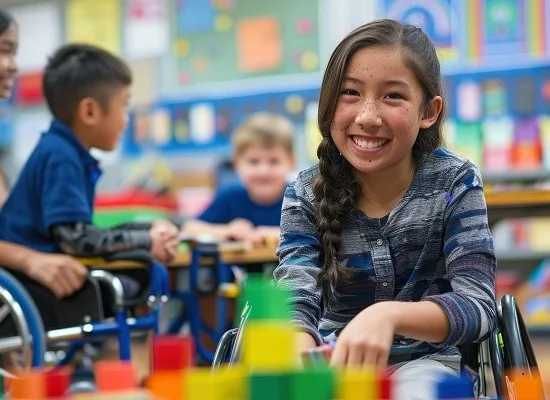
Eligible Chicago families who have children with disabilities in grades K-12 can apply for a chance to receive a one-time grant through Oct. 30
If you live in Chicago and have at least one child with disabilities enrolled in a public or private k-12 school, you may be eligible for a one-time grant.
The Chicago Mayor’s Office for People with Disabilities and Ada S. McKinley Community Services has launched the Diverse Learners Recovery Fund for students with disabilities.
The program aims to help families who were uniquely challenged by the COVID-19 pandemic.
The fund will provide one-time grants of $500 to up to 8,000 eligible K-12 students through a lottery. Students with autism, physical and developmental delays and other disabilities may be eligible.
Families can use these funds to pay for things such as medical expenses, supplemental education resources or other accommodations their student needs.
Parents and guardians can apply for the Diverse Learners Recovery Fund grant at www.AdaMOPD.com through Oct. 30.
Families applying for the grant must:
- Live in Chicago
- Have a student currently enrolled in a K-12 public or private school
- Have an Individualized Education Program (IEP), a 504 Plan, an Individual Support Plan (ISP), or a doctor’s note verifying a disability diagnosis covered under the Americans with Disabilities Act
- Have a household income level at or below 300 percent of the federal poverty level
Families can receive a maximum one-time payment of $500 for one student and $1,000 for two students.
The program will select recipients using a lottery system. All eligible applications will be included in the drawings on:
- July 1
- Sept. 16
- On or after Nov. 30
Submitting an eligible application does not guarantee you will receive the funds. Eligible applications that are not chosen will be included in the following drawing(s).
See the Diverse Learners Recovery Fund flyer for more information on the fund and eligibility requirements. It also has a QR code to apply.
You can also visit the Diverse Learners Recovery Fund for Students with Disabilities website. The site features tools to help with the application process, including:
- A video
- Eligibility requirements
- Frequently asked questions and a chart to help determine the federal poverty level
- A list of documents necessary to complete your application
- Contact information (phone and online)
If you’re ready to apply, be sure to set up your Diverse Learners Recovery Fund for Students with Disabilities account online.
The deadline to apply for a chance to receive a grant is Oct. 30.
The program receives funding from The Coronavirus State and Local Fiscal Recovery Funds (SLRF) program authorized by the American Rescue Plan Act (ARPA).
Former DSCC Participant Connects Youth with Hearing Loss to Services and Support
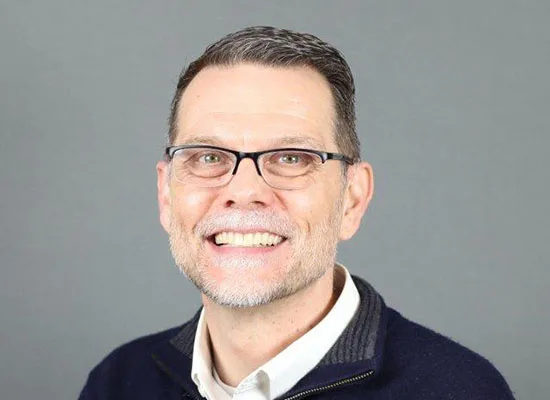
Todd Williams received Division of Specialized Care for Children (DSCC) support growing up and now leads the Evaluation Center at the Illinois School for the Deaf
Todd Williams has come full circle.
Todd, 53, grew up with hearing loss that wasn’t diagnosed until late in his childhood. He enrolled with the University of Illinois Chicago’s Division of Specialized Care for Children (DSCC) and a new world of access opened to him.
That access and support led him to a career that’s opening doors and opportunities for countless other Illinois families of children who are deaf or hard of hearing.
Todd is currently the Evaluation Center Director at the Illinois School for the Deaf (ISD). In this role, he helps school children with hearing impairments all over Illinois receive the right assessment, enrichment and intervention services.
Todd also speaks with parents during the annual Institute for Parents of Preschool Children Who Are Deaf or Hard of Hearing on the ISD campus in Jacksonville each June. The Institute is a partnership of DSCC, the Illinois School for the Deaf and other sponsors. It provides valuable education, resources and connections to families of young children with hearing loss in Illinois.
“My involvement with Parent Institute is just to be an advocate and tell them… ‘I’m a client of this program. So, please take advantage of the services that are out there,’” he said.
“The services don’t just come to you. You have to make an effort.”
Todd explains more about how he helps empower and inspire Institute families in the video below:
Todd says he is thankful for the support his family received when they needed it most.
He was in the sixth grade when his language arts teacher noticed something was “off” and mentioned it to his mother.
“Sometimes you don’t know what you don’t know until you do,” Todd said. “Once my hearing was tested, they couldn’t figure out why I was functioning so well! I remember being able to read lips. Even though I might not hear the bell ring, I could see what the other kids were doing and follow along.”
Todd said his hearing loss was mild to moderate at that time, and school wasn’t a struggle.
He was then diagnosed with bilateral sensorineural hearing loss, a condition where there is damage to the tiny hair cells in the inner ear (known as stereocilia) or to the nerve pathways that lead from your inner ear to the brain.
“We don’t know what caused my hearing loss, but I was sick a lot as a young child with allergies and ear infections,” Todd said. “I must have had hearing at some point because I know what letters and other sounds should sound like, so my speech wasn’t greatly impacted.”
He attended public school during the recession of the 1980s, and money was tight for his family as they started researching how to best support his hearing loss.
“The economic situation was terrible, and probably everybody in town was getting or needed some sort of assistance,” Todd explained.
His mom attended a town meeting about available services, and a woman told her about DSCC.
“That was back when DSCC was called the Division of Services for Crippled Children,” Todd said. “Thankfully, the name has changed, inclusion is growing, and the woman impressed on my mom that DSCC could help.”
For 87 years, DSCC has partnered with Illinois families to help connect children with special healthcare needs – including hearing loss – to the services and resources necessary to reach their full potential.
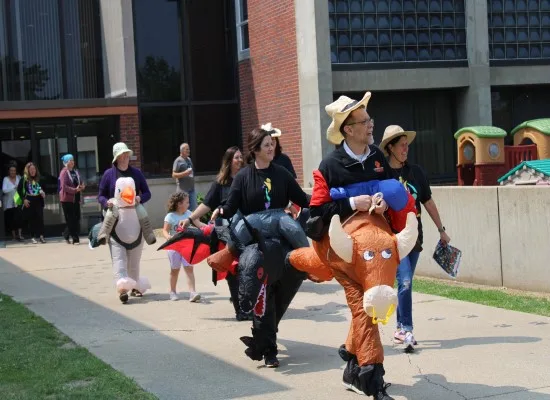
Thanks to DSCC, Todd began to see audiologists and providers who could help. He also received financial support for the cost of his first hearing aid. (DSCC can provide financial assistance for some eligible medical expenses when families meet certain income guidelines.)
“Having my hearing aid was access. We would have found the money somewhere, but it would have been an incredible hardship,” Todd said. “It was no coincidence that things fell in line. With DSCC it was amazing, perfect timing. That’s the beauty of it.”
Later, when his family moved, DSCC went with them.
“No matter where you go in Illinois, DSCC is there,” Todd said. “They were there to help my family with appointments and hearing aids. I got a second hearing aid when I was a sophomore and getting closer to aging out of the program.”
Todd later started planning for college. He took a placement test at John A. Logan Community College in Carterville. While there, a gentleman saw his hearing aids and gave him contact information for the Division of Rehabilitation Services (DRS or DORS) program.
“DORS helps individuals with disabilities become independent, productive citizens. They helped me through school, and I got my master’s at no cost,” Todd said.
He attended Illinois State University and earned a bachelor’s degree in teaching deaf and hard-of-hearing students. He later earned his master’s degree in counseling as well.
Over the years, Todd has worked in education and counseling and served as a deaf/hard of hearing consultant for the state. He also progressed from being hard of hearing to deaf. Todd now has cochlear implants, which unlocked a new world of sounds for him.
He became ISD’s Evaluation Center Director in December 2020. He says he enjoys empowering families and serving as a role model for youth with hearing loss.
“I had a little kid come up to me in the dining hall who was all excited because I had two implants just like him,” Todd said. “So, there’s the role model part, too, which is important for our kids to see that adults do walk around with these (implants), and they are successful.”
Todd encourages families of young children with hearing loss to attend the Institute and learn how ISD, DSCC and other state programs can benefit their children and families.
“Don’t miss out on a chance when you can really gain the most comprehensive evaluation for your child, and the resource list will be phenomenal,” Todd said.
“You have the ability to ask questions, to get questions answered that maybe you’re not feeling comfortable with asking in another setting. That’s what we’re here for. We’re here to answer questions and become a resource for you so the programing for your child can be the best that it can be. That’s our goal.”
Sensory-Friendly Holiday Happenings in Illinois
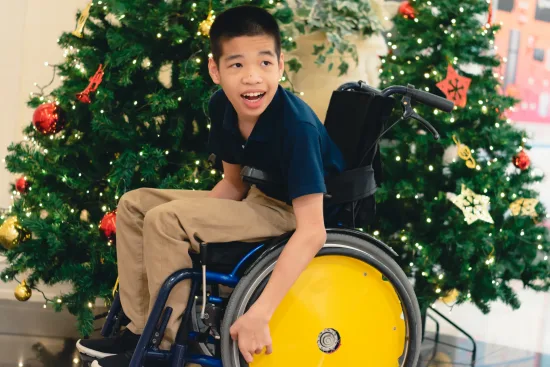
Fun, inclusive events the whole family can enjoy throughout Illinois!
How will you make memories this holiday season?
There are light displays, sensitive Santa opportunities, parades and more going on throughout Illinois.
Our Special Events page includes a roundup of opportunities designed specifically for youth with disabilities and special healthcare needs.
You can also browse this collection of special programs and event guides for opportunities to create some holiday magic and plenty of smiles:
- Autism Speaks and Cherry Hill Programs will provide sensory-friendly Santa experiences in Illinois and the St. Louis area on Dec. 3. These visits are free. Keepsake photo packages will be available for purchase. You must sign up to attend. Visit the Santa Cares website for a complete list of Santa’s stops. Be sure to select “Santa Cares”, “Caring Santa” or “Sensitive Santa” when checking your location. (Note some event dates and times may vary. Please check your location to confirm your date and time.)
- The National Federation of the Blind is offering letters from Santa and winter celebration letters in Braille to children who are blind or have low vision. The program is for children ages 10 and younger. Please complete the letter request form before Dec. 15. If you have any questions, call (410) 659-9314, ext. 2236, or email education@nfb.org.
- The Secret Sleigh Project is coordinating volunteers to provide in-home Santa visits to children who are medically fragile. Use the “Request a Santa Visit” form on the project’s website to request a visit.
- For families in the southern Illinois area, SI Families’ event calendar provides a great list of fun, seasonal activities. Other events in the area include Sensitive Santa at Heartland Regional Medical Center in Marion, the Carbondale Lights Fantastic Parade, and the DuQuoin Holiday Lights Fair.
- For options in central Illinois, check out these lists from ChambanaMoms.com and Springfieldmoms.org. Great places to see lights include Chatham Lights up the Park, Festival of Lights in East Peoria, and Mattoon Lightworks.
- For Chicagoland residents, WTTW Public Television, Chicago Parent Magazine and Kidlist have some great suggestions for things to do and see. Want to catch a show? Chicago Children’s Theatre features accessible weekends for children and their families.
- Don’t forget to check with your local zoos! The St. Louis Zoo and Lincoln Park Zoo will offer a sensory-friendly viewing option. Contact your local zoo to see what’s happening and when.
We will continue to add holiday events and activities, so please check our Special Events page often throughout the season.
If you know of a good sensory-friendly event to share, please email us at dscc@uic.edu.
Please note, the University of Illinois Chicago’s Division of Specialized Care for Children (DSCC) is not involved in organizing or scheduling these holiday events. If you have questions about a specific event, please contact the event sponsor or organizer.
Sensory-Friendly Easter Bunny Visits
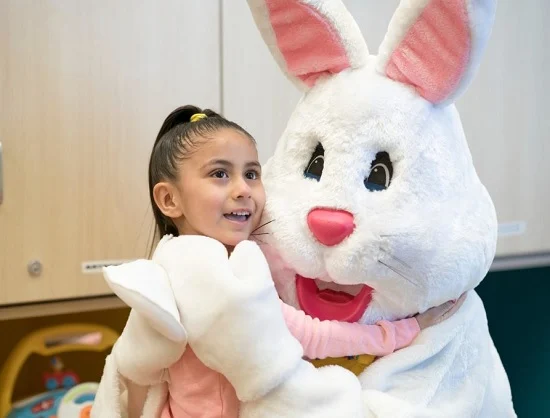
Hippity-hoppity, the Easter Bunny is on its way!
Sensory-friendly Easter Bunny visits are happening at sites throughout Illinois and the St. Louis area. Individuals of all ages and abilities may schedule an appointment.
The visits will take place in a calmer, quieter environment that supports visitors’ sensory, physical and developmental needs. Autism Speaks is partnering with Cherry Hill Programs to provide these special Easter Bunny photo events.
The Bunny Cares experiences are free. Photos will be available to buy at each event.
You can see the Easter Bunny on March 26 at the following locations (in the “Reserve” section for each location, click on the “Events” button and select “Bunny Cares”):
- Fox Valley
- Frontenac Plaza (Missouri)
- Hawthorn Mall
- Market Place Shopping Center
- Northwoods Mall
- Orland Square Mall
- White Oaks Mall
- Woodfield Mall (also hosting an event on April 2)
Reservations are limited. Visit the Bunny Cares website for a complete list of sites and to reserve your spot.
Many communities are also hosting sensory-friendly egg hunts and opportunities to meet the Easter Bunny. To find these events and other family-friendly spring activities, hop on over to our Special Events page.
2020 Census Matters for Children With Special Healthcare Needs
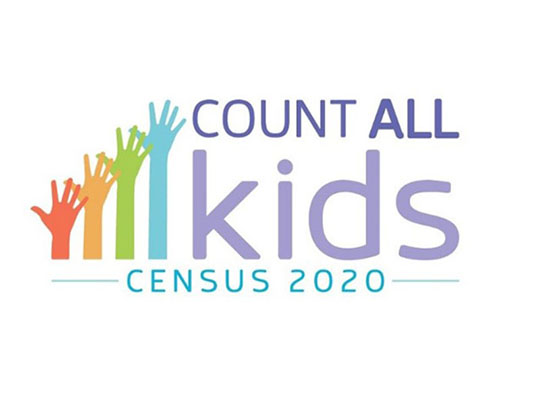
The count helps support key programs and services for children and families.
Every 10 years, the U.S. Census Bureau counts all people in the United States. This count determines how much federal money is available for services and programs for children, including those with special healthcare needs.
By filling out the 2020 census form, parents can help ensure their children have the resources they need.
In March, the government will send every household a letter in the mail. This letter has instructions on how to fill out the census form.
The form asks for a count of everyone living at the address as of April 1, 2020. The count should include babies, young children and children with special healthcare needs and disabilities.
During the 2010 census, nearly one million young children were not counted, according to the Association of Maternal and Child Health Programs (AMCHP).
If young children are not counted in the 2020 census, the following programs could lose funds:
- Medicaid
- Children’s Health Insurance Program
- Supplemental Nutrition Assistance Program (SNAP)
- Title I funding
- Individuals with Disabilities Education Act (IDEA) special education funding
- Head Start
- Childcare and Development Block Grants
States and communities also use census data to fund and develop programs and services for children and families.
All census responses are confidential. Your answers are not shared with anyone and are only used to count the number of people in the country.
AMCHP provides a 2020 census fact sheet for parents. (A Spanish fact sheet is also available.) It explains how the census works, how young children should be counted and confidentiality.
The U.S. Census Bureau also provides helpful resources for parents:
You can also watch the Census Bureau video below:
Focus Group: Share Your Insight About Early Intervention

Families of young children with disabilities are invited to participate.
The Early Intervention Clearinghouse (EIC) at the University of Illinois at Urbana-Champaign is conducting focus groups with families of young children with disabilities. The purpose is to learn their perspectives about needed supports, information and services.
Participants must be the parent or family member of a young (age birth to 8 years old) child who received Early Intervention services.
The focus groups will be held at four different locations:
- Chicago – Family Resource Center on Disabilities, 11 E. Adams St. Suite 1002, on March 22 at 10:30 a.m.
- Normal – Eastview Christian Church, 1500 N. Airport Road, on March 29 at 5:30 p.m.
- Grayslake – Therapeutic Links, 998 Progress Drive, on April 6 at 10 a.m.
- Villa Park – Easterseals DuPage & Fox Valley, 830 S. Addison Ave., on April 10 at 7 p.m.
For more information and to participate, please contact Meghan Burke at (217) 300-1226 or meghanbm@illinois.edu.


